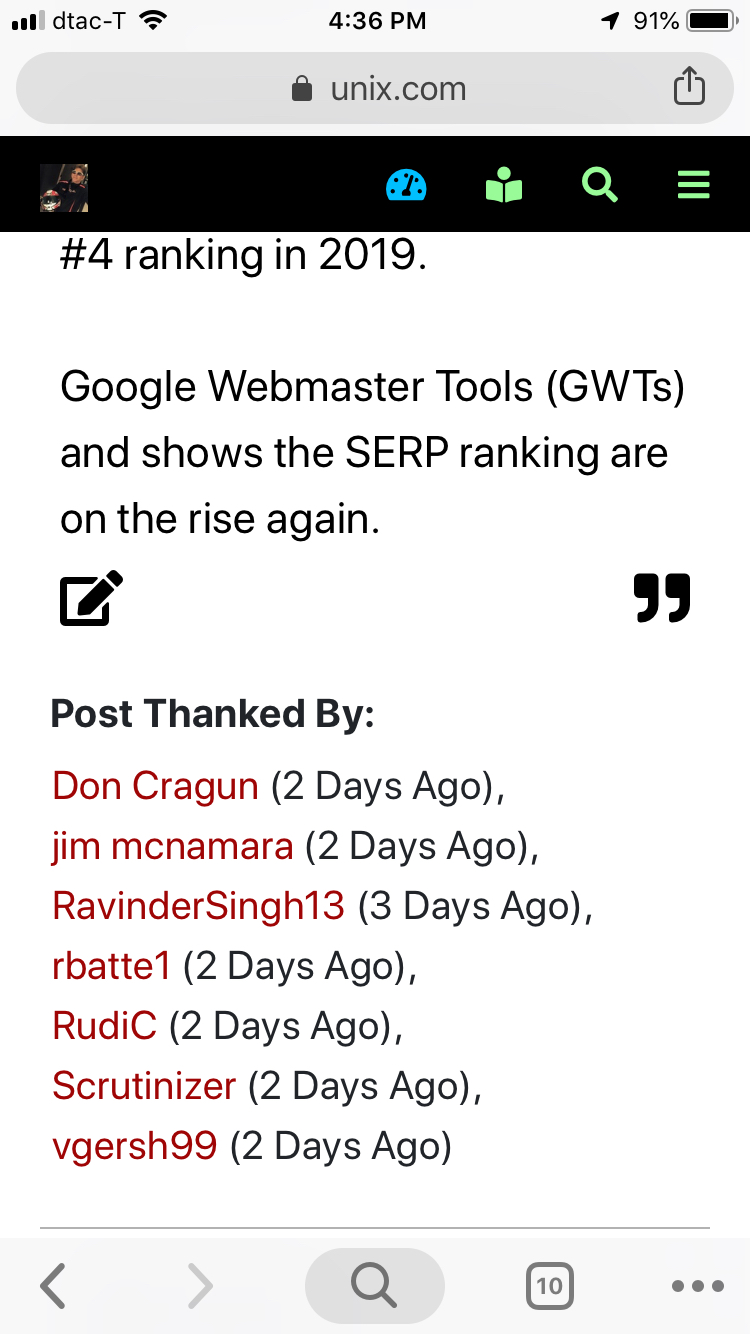|
|
Sponsored Content
The Lounge
What is on Your Mind?
Mobile Thanks Now Visible in Mobile
Post 303028665 by Neo on Saturday 12th of January 2019 04:39:59 AM
|
|
4 More Discussions You Might Find Interesting
1. SuSE
can anyone tell how to install (load) linux OS on my mobile (1 Reply)
Discussion started by: daya.pandit
1 Replies
2. What is on Your Mind?
Do we have a mobile app for unix.com? (1 Reply)
Discussion started by: ahamed101
1 Replies
3. What is on Your Mind?
RE:
https://www.unix.com/what-is-on-your-mind-/280775-thanks-button-coming-mobile-soon.html
Now, the "Thank You" icon is working on mobile so all registered members can "give thanks" on mobile.
Seems to work fine. (2 Replies)
Discussion started by: Neo
2 Replies
4. UNIX for Advanced & Expert Users
Hello Folks,
I need to send the output from shell script to range of mobile phones based on their msisdn . Is there any open source solution could help me to do so from CentOS or redhat ?? (11 Replies)
Discussion started by: arm
11 Replies
LEARN ABOUT DEBIAN
upscli_list_start
UPSCLI_LIST_START(3) NUT Manual UPSCLI_LIST_START(3) NAME
upscli_list_start - begin multi-item retrieval from a UPS SYNOPSIS
#include <upsclient.h> int upscli_list_start(UPSCONN_t *ups, int numq, const char **query) DESCRIPTION
The upscli_list_start() function takes the pointer ups to a UPSCONN_t state structure, and the pointer query to an array of numq query elements. It builds a properly-formatted request from those elements and transmits it to upsd(8). Upon success, the caller must call upscli_list_next(3) to retrieve the elements of the list. Failure to retrieve the list will most likely result in the client getting out of sync with the server due to buffered data. USES
This function implements the "LIST" command in the protocol. As a result, you can use it to request many different things from the server. Some examples are: o LIST UPS o LIST VAR <ups> o LIST RW <ups> o LIST CMD <ups> o LIST ENUM <ups> <var> o LIST RANGE <ups> <var> QUERY FORMATTING
To see the list of variables on a UPS called su700, the protocol command would be LIST VAR su700. To start that list with this function, you would populate query and numq as follows: int numq; const char *query[2]; query[0] = "VAR"; query[1] = "su700"; numq = 2; All escaping of special characters and quoting of elements with spaces are handled for you inside this function. ERROR CHECKING
This function checks the response from upsd(8) against your query. If it is not starting a list, or is starting the wrong type of list, it will return an error code. When this happens, upscli_upserror(3) will return UPSCLI_ERR_PROTOCOL. RETURN VALUE
The upscli_list_start() function returns 0 on success, or -1 if an error occurs. SEE ALSO
upscli_fd(3), upscli_get(3), upscli_readline(3), upscli_sendline(3), upscli_ssl(3), upscli_strerror(3), upscli_upserror(3) Network UPS Tools 05/31/2012 UPSCLI_LIST_START(3)
